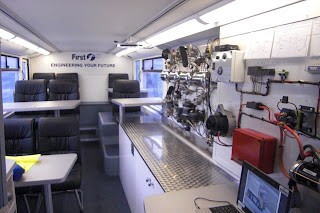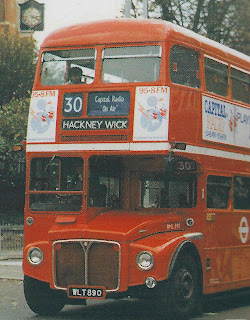In my last blog on Monday I mentioned our resident Obsolete Fleet conductor, Harry Cook.
A former Croydon Corporation tram driver he converted to motorbuses and in due course, as a senior and permanently affable man ended up one of the high quality staff chosen as a driver to be in charge of London's first minibuses - Ford Transits - in 1972, in his case from Stockwell.
At retirement age, Harry was called into the Stockwell Garage Manager and thanked for his 40 years' service, 250 private hires to his credit, never sick, never late, and no complaints.
Sharp as ever, Harry brought out the Croydon Corporation takeover agreement which provided for all its employees to be retained for as long as they were fit and capable. Despatched to Chiswick he passed a driving assessment, and to Baker Street to pass his medical - they had to keep him on.
By the time he was 69 or so he indicated his intention to retire from driving, so was thanked for his 44 years' service, 255 private hires, never sick, never late, and with no complaints - as the Garage Manager said "we will miss you"
"Oh no" he said cheerfully, "I said retire from driving - I want to go conducting!" (Which he did).
Eventually with pressure from the Trade Union he did indeed leave Stockwell to come and work for us. He was exactly the right person to work 'on the back' of ST922 where his cheery disposition was a hit with tourists.
But his work ethic was astounding for a man in his 70s. Every morning he would open up Nunhead Garage and check all the buses for oil and water. He would sign in all the staff and send them out on time. Then he would go out on ST922 and work the first half of the duty on route 100. During the lunch break he would come to our office at 17 Air Street, balance yesterday's takings (all coin of course) and take them to the bank. Then he would work the second half of the duty on route 100, go back to the garage, see everyone in, lock up and go home.
Seven days a week.
In about 1979 he achieved another first. Route 74Z between Baker Street and the Zoo was doubled in frequency and used two buses. They were to be one-man operated with two AEC Regent Vs we bought from Devon General (507 and 508 RUO). However they weren't quite ready so we used two D9s instead.
Sadly we only had one conductor so Harry would travel to Baker Street on the first bus, collect the fares and send it off. He would then board the second bus, collect all the fares until he got to near Lord's cricket ground. Then he would get off, cross the road and catch the first one on its return journey! Back to Baker Street and start again. And to give you an idea the journey was about 7 minutes' long so that shows you how intensively he was working.
Thus he conducted two buses simultaneously for a whole day - probably the first and last time a London bus conductor ever did such a thing! The only change was that for the afternoon he worked from The Zoo end southbound, with the peak flow, rather than from the Baker Street end.
He lived a very long and happy life. He put this down to his smoking of Capstan Full Strength cigarettes which he believed warded off all possible germs and diseases. He also wore his London Transport cap at all times - he considered it a passport to international recognition and free travel.
A work ethic we rarely see today, and one which we really miss, of course.
And as for today's title. Well you have to remember there were no mobile phones, and calls from staff were generally made from public callboxes. You dialled the number, and when it was answered there were rapid pips whilst you inserted coins. Once enough money was paid then you were connected. Many of our old staff will remember Harry's voice as he said "Nun'ead Garidge.....put yer money in....."
....



































